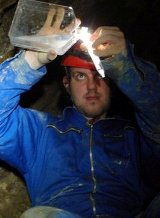Biography
When I first went to University, I read for an M.Sci Chemistry at King's College London, however, soon after I started, it was announced that the Chemistry Department would be closing in the near future and, as such, I decided that jumping-ship would be a wise move. After two years in the Chemistry Department, I moved to the Division of Life Sciences to read a B.Sc Biochemistry, starting all over again. I chose Biochemistry after studying environmental and medical chemistry modules and finding that "real world" chemistry was far more interesting than organic synthesis or predicting reaction rates. Because I had already sat a large number of the exams required for the B.Sc Biochemistry (i.e. all of the Chemistry modules!), I was permitted by the Division to undertake various research projects intended for final year students in order to fill up my timetable in order for me to remain as a full-time student. The first of these projects was in Professor Alan Ebringer's group and concerned the relationship between transmissible spongiform encephalopathies (such as Creutzfeldt-Jakob disease and bovine spongiform encephalopathy), multiple sclerosis and Bacteria from the genus Acinetobacter, leading to my first publications as an undergraduate. I then went on to undertake research in Dr Ann P Wood's lab, isolating and characterising Bacteria capable of metabolising methylated amines (i.e. mono-, di- and trimethylamine) from River Thames sediment. At this stage, I decided that I wanted to continue research in the area of one-carbon compounds and moved to the University of Warwick where I conducted research into the physiology of Bacteria capable of metabolising dimethylsulfide, under Dr Hendrik Schäfer and Professor J. Colin Murrell and funded by the Natural Environment Research Council (NERC), being awarded my Ph.D in 2009. I then went on to work as a Research Fellow for Dr Paul R Norris (University of Warwick) studying sulfur and iron metabolism in acidothermophilic Bacteria used in the mining industry, funded by BHP Billiton PLC. In September 2009 I returned to Professor Murrell's lab where I am now working on microbially driven biogeochemical cycling in Movile Cave, Romania, with particular focus on sulfur metabolism. You can read more about the research from my Ph.D here.
Away from the research laboratory, I worked for 8 years as a member of Residential Life staff at both King's College London and at the University of Warwick, being resposible for the welfare and discipline of over 2000 undergraduate and postgraduate students during this time. I demonstrated during Second Year Microbiology undergraduate lab classes for three consecutive years and went on to supervise First Year Microbiology undergraduate lab classes. I have designed and supervised a number of final year undergraduate research projects and designed and supervised project work with sixth form students from the Science in the 21st Century initiative, based at the Warwick School.
I have presented my work at a number of international conferences and have recieved a number of awards for my presentations, including an ASLO Outstanding Student Presentation Award in 2009. In 2008, I was named SGM Young Microbiologist of the Year for my work on dimethylsulfide metabolism in Methylophaga thiooxidans. Based on my experience of presenting my data to international audiences and the recognition I have achieved for it, I was invited to give a presentation on giving talks at conferences to Ph.D students and Research Fellows as part of the Institute of Advanced Study's How To Get Your Research Noticed
How To Get Your Research Noticed programme in April 2009.
programme in April 2009.
In 2009 I was elected as a Fellow of the Linnean Society of London , as a Member of the Royal Microscopical Society
, as a Member of the Royal Microscopical Society and as a Member of the Society of Biology
and as a Member of the Society of Biology .
.

Rich Boden
Rich dot Boden at warwick dot ac dot uk

